# 2 More Mad Men of the Peace Corps
John writes —
If you ever had watched the TV show Mad Men you know all about the office atmosphere and the thick layer of smoke that filled the offices. It was no better in the Peace Corps during those early years of the 1960s. Flipping through pages of old Peace Corps publications, I see half a dozen people who I knew, all with cigarettes in their hands. Al Meisel in the Training Division; Charlie Peters, head of Evaluation; Jim Gibson, head of Agricultural Affairs. He liked cigars and smoked them in the building! The wonderful Jules Pagano. Other heavy smokers: Howard Greenberg in Management; Jack Vaughn, the second director; Frank Mankiewicz; evaluator Dick Elwell, (as I recall, everyone in evaluation smoked and drank and wrote great prose). Doug Kiker and his crew in Public Affairs knew how to light up. And so did Betty Harris.
When the Mad Men weren’t smoking, they were drinking. Warren Wiggins told me that during his years at the Peace Corps he was a three-martinis-at-lunch guy. I knew him best after his Peace Corps years when he had quit drinking altogether.
And, of course, besides the cigarettes and the booze, there were plenty of office affairs, trysts, and assignations, as well as some wonderful romances and marriages.
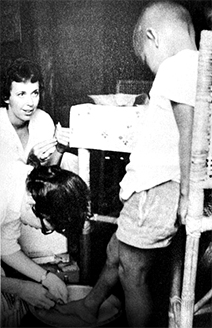
Maureen Carroll (Philippines 1961-63) I believe was the first RPCV hired by the agency. She worked in the Evaluation Division.
But what made those days fun for me were when the RPCVs came marching home. If you were a former PCV in ’63 and ’64, and could find 806 Connecticut Avenue, you were hired. The agency was desperate for ‘real life examples’ of Peace Corps Volunteers. It helped if you didn’t have any noticeable tics developed overseas, but really that didn’t matter either. A lot of us had tics.
There was this one early RPCV recruiter who when he was on campus and was asked that familiar questions all of have endured. “So, you were in the Peace Corps? What was it like?” would crumble at the asking. He would shake his head, lean forward, put his face in his hands, and begin to mumble.
Then there was the woman who had served, I believe, in Pakistan, and who wore her host country dress to work everyday for months after she returned to the U.S., as if she couldn’t let go of the experience, or wanted to prove that she was ‘the real thing,’ until Bill Moyers, then the Deputy Director,(who was only 27 or 28 himself) took her aside and had a friendly chat, saying that perhaps it was time for her to come all the way home.
But mostly, as fresh RPCVs, we were brash and arrogant, as well as, smart asses and thought we knew how to run the Peace Corps. It is a wonder we weren’t all sent on our merry way.
You could always tell the RPCVs in the building. They never waited for any elevator. They took the stairs two at a time. They came in early. They worked late. They drank beer from the bottle in an outside cafe around the corner from the office. They lived in studio and one bedroom apartments downtown in D.C. and walked to work; they were mostly single, mostly still suffering from reverse cultural shock, and they believed in the Peace Corps with a religious fervor.
And even to this day, ask any of us what was the best thing we ever did in life, or the best job we ever had, and we’ll all say the Peace Corps. It is rather amazing that one job, one building, one moment in time, could matter that much or linger with us over the years, but it does. And come to think of it, in those offices in that old Maiatico Building, we were all Mad Men and Women, and we had better stories to tell than what was put on television years later.
If there was one HQ staffer (who was young but not a PCV) who could have walk straight onto the set of Mad Men, is was Doug Kiker of Griffin, Georgia. Kiker was an original “mad man” in his brief time at the Peace Corps as chief of the division of public information.He would leave the Peace Corps in 1963 for the New York Herald Tribune, and on his first week on that job, he was riding in the press bus in the motorcade with JFK when the president was assassinated. By 1966, he was with NBC News as an on-air reporter and he would remain with that network for the rest of his life. He died of a heart attack in 1991 at the age of 61.
Kiker came from the south, from Presbyterian College in Clinton, South Carolina, majoring in English and wanting to be a writer.
His first short story was published in the Yale Review while he was still an undergraduate, and also while he was an undergraduate he worked as a reporter in Spartanburg, South Carolina, assigned for a good part of this time to covering the Senate race between Strom Thurmond and Olin Johnston.
As most of the ‘mad men’ of that time he has the uncanny ability to be right in the center of the action, shown by being on the bus in Dallas that fateful day.
He went from college into the Korean War, joining the Navy, and after Officer Candidate School was assigned as a gunnery officer aboard a carrier in the middle of the Korean War. Later he taught at Newport Officer Candidate School before his discharge as a Navy Lieutenant.
He worked next for the Atlanta Journal, and was there for the sit-ins at the lunch counters in North Carolina and covered much of the civil rights movement. He became somewhat of an expert on the subject, not only in the South, but across the country, and published a major article on desegregation for Look Magazine.
He was also writing fiction. In 1957, he published The Southerner, the story of a black educator who goes from North to South to participate in the struggle. The book was a success in the U.S. and overseas, and he followed that novel in 1959 with Stranger on the Shore, a novel about life in the peacetime Navy.
By 1961 he was living in Washington and writing for the Atlanta Journal, a weekly column that also appeared in other Cox newspapers, but he left that in early 1962 to join the new Peace Corps as the chief of Public Information.
The first director of Public Information was a guy named Ed Bayley. Bayley had had a decade-long career as a reporter for the Milwaukee Journal. He, too, had been in the Navy, but in WWII, and then returned to Wisconsin and worked as a reporter. Immediately before coming to the Peace Corps he was the executive assistant to Wisconsin’s Governor Gaylord Nelson. When he left the agency he took over the job as the information director of the new AID.
Public Information was key division in the agency in those days. They were ‘selling’ the Peace Corps to the  public. Gerard T. Rice in his book, The Bold Experiment: JFK’s Peace Corps, writes that “The Peace Corps’ public relations exercises were slick, professional, and effective. Television cameras were invited into training camps; Volunteers appeared as guests on ‘What’s My Line’; celebrities’ visits to overseas programs made national headlines. The President’s association with the Peace Corps was particularly well publicized: meeting Volunteers in the Rose Garden as they left for overseas or congratulation them on their return.”
public. Gerard T. Rice in his book, The Bold Experiment: JFK’s Peace Corps, writes that “The Peace Corps’ public relations exercises were slick, professional, and effective. Television cameras were invited into training camps; Volunteers appeared as guests on ‘What’s My Line’; celebrities’ visits to overseas programs made national headlines. The President’s association with the Peace Corps was particularly well publicized: meeting Volunteers in the Rose Garden as they left for overseas or congratulation them on their return.”
Bayley and then Kiker steered the good news into the press. It wasn’t hard. Most of the reporters who covered the Peace Corps in D.C. and elsewhere were sympathetic to the idea of the agency and anxious to help. As Kiker explained in 1962, “We are neither in the business of publicizing our mistakes nor of hiding them.” But as Kiker, and everyone else knew, if “enough goofs” became known in the press, the Peace Corps would soon be out of business.
Luckily most of our early ‘goofs’ didn’t become public!
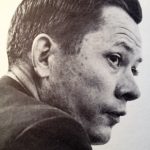
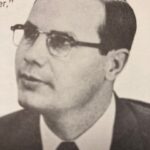
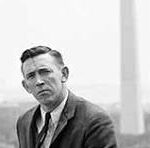
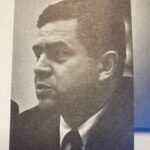
The local cafe/bar/hotel next to the Miatico building ( just to the left on Connecticut Avenue )was The Claridge— a local dive nearly as shabby as some of the bars and hotels PCVs used in their host countries or when hitchhiking on their way home. A room there was $9/night and if you were there on PC duty your per diem was $12 per day, so u ate ur meals at the Peoples Drug Store around the corner on H Street
All part of the delightful madness of those PC days
Wasn’t there also a Hot Shoppes there on H Street? Alternatively, you could take a bag lunch out into Lafayette Park.
Let’s not forget the Chez Francois next door. Great drinks and food.
Great Article John, thank you. A trip down nostalgia lane.
Great article. Appreciate reading about the early days. Well done.
I thoroughly enjoyed this piece, John. Keep them coming!
John: Thanks for this reminder of the early days. Looking forward to further chapters. I was there as an Antioch College intern in 1962, and then got hired full time after I graduated in 1963. Until I was reassigned to the Africa Region, I was in the least glamorous office — PDO/C, which was responsible for allocating PCVs to the various regions and country programs, and where bureaucrats ruled. Based on little evidence other than a few evaluation reports and our boss, John Alexander’s gut instincts, our job was to try to decide which projects were worthy, and which weren’t. When there were disputes, which were frequent, regional directors like Frank Mankiewicz and Franklin Williams would appeal our decisions to Shriver, who usually sided with the directors who swore to the effectiveness of their country programs. I think one of the secrets behind the Peace Corps’ early success was that Shriver hired experienced agency bureaucrats like Warren Wiggins and other managers from USAID to back up the more flamboyant and creative stars like Mankiewicz.
There was also a cafeteria, Scholls, or something like that that had the best rhubarb pie ever made. The food was wonderful and cheap, especially for those who were just starting out to look for jobs.
Shortly after returning from the Peace Corps in Tanzania in 1968, I was drafted into the Army and was soon stationed at Ft. Myers just across the river from D.C. at the Army’s east coast language school. Talk to me about cultural re-entry crises. Crossing the bridge toward the Lincoln Memorial, I saw more cars in five minutes than I’d seen in two years. I walked into DC frequently and passed the PC Headquarters on Connecticut Ave. but never stopped in figuring I’d have been considered some sort of traitor. Continued up to Dupont Circle to a cinema that showed New Wave French films and dined frequently at a Greek restaurant in the area.
Name of that Greek place was The Astor or The Astro.
John, Am enjoying your articles about the very early Peace Corps office. Returned home from Colombia in 1964, found a “real” job in DC, but early on knew it was not for me… but still had to keep working. Never thought to go down the street to the Peace Corps office to apply for a job, but found myself there frequently. A staff member there, another RPCV from Colombia, learned of my unhappiness.. so on more than one occasion, he would telephone the Director of the agency where I was working with the statement “this is Shriver’s office calling, Ms. Gillies is needed at a Peace Corps meeting on such and such a day and time.” And I would be released to attend a “very important conference” in the PC office. These meetings usually happened at the end of the business day. Within the Federal Government, there is some sort of informal agreement about mutual exchanges of staff people for government business. It was pure insanity, but it did save me.
Doug Kiker and my father, Bob Gale (Mad Men #20) worked on the recruiting trip to Michigan that went gangbusters. Doug and Bob decided to hold regular “Thursday Night” parties at their homes and, during the summer months, they took turns living with each other while one of the two family homes (either Gale or Kiker) were rented out for the summer to make extra money. My mother remembers coming home one summer day to find dozens and dozens of eggs in the fridge, as neither of the men had remembered to cancel the regular egg delivery for the summer and, instead, just continued to load the excess in the fridge.